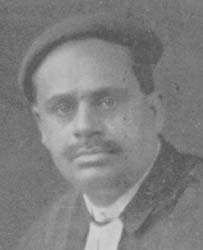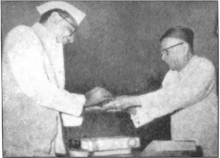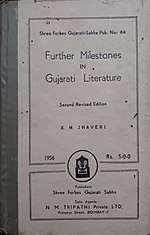Krishnalal Jhaveri
Diwan Bahadur Krishnalal Mohanlal Jhaveri (30 December 1868 – 15 June 1957) was an Indian writer, scholar, literary historian, translator, and judge from Gujarat, India. His works have been published in Gujarati, English, and Persian. Jhaveri served as president of the Gujarati Sahitya Parishad from 1931 to 1933.
Krishnalal Mohanlal Jhaveri | |
|---|---|
 | |
| Born | Krishnalal Mohanlal Jhaveri 30 December 1868 Broach, now Bharuch, British India |
| Died | 15 June 1957 (aged 88) Mumbai, India |
| Pen name | Rafeeq, Hakir |
| Occupation | Scholar, literary historian, translator |
| Language | Gujarati, English, Persian |
| Residence | Mumbai |
| Nationality | Indian |
| Education | MA, LLB |
| Alma mater | Elphinstone College |
Life
Krishnalal Jhaveri was born on 30 December 1868 in Broach into a family of educators. His grandfather, Ranchhoddas Girdhardas Jhaveri, was a pioneer in the field of education and laid the foundations for educational services in Gujarat. Jhaveri's father, Mohanlal Ranchhodlal, was one of the founders of a number of primary schools in the Surat District.[1]
After finishing school in Broach, Surat, and Bhavnagar, Jhaveri attended Shamaldas Arts College in Bhavnagar where he earned a Bachelor of Arts in English and Persian in 1888. In 1890, he finished a Master of Arts degree in English and Persian at Elphinstone College where he began working as a lecturer of the Persian language. After completing a Bachelor of Laws in 1892, he started his career as a lawyer in 1893. Jhaveri practised on the appellate side of the High Court of Bombay from 1903 to 1905. At the Presidency Court of Small Causes he served as a judge from 1905 to 1917 and as a chief judge from 1918 to 1928. Jhaveri also served as chief judge at the High Court of Palanpur State.[2][3]

He was appointed as president of Gujarati Sahitya Parishad from 1931 to 1933. He was the president of the Forbes Gujarati Sabha for three decades, one of the founding members of the Bharatiya Vidya Bhavan, a member of the Syndicate of Bombay University, and the vice-chancellor of Shreemati Nathibai Damodar Thackersey Women's University.[4][2][1] He was a member of Government Book Committee and Bombay Presidency Social Reform Association and served as joint secretary of Pleader's Association.[5]
Works

Jhaveri wrote under the pseudonyms Rafeeq and Hakir. He was a profound scholar of Persian[4][2] and contributed significantly to the field of literary history.[7]
He wrote the books Milestones in Gujarati Literature (1914) and Further Milestones in Gujarati Literature (1921) which give a detailed history of Gujarati literature from its initial stage to the modern period. Both books have been translated by Ramlal Modi, Motilal Modi, and Hiralal Parekh into Gujarati as Gujarati Sahityana Margasuchak Stambho (1930) and Gujarati Sahityana Vadhu Margasuchak Stambho (1930). He was one of the first to publish a book on Gujarati literary history in English. His other significant works in history include Haiderali Ne Tipu Sultan (1894), Dayaram ane Haphejh (1895), Badshahi Faramano, and Gujarati Lakhela Parsi Granth (1945). He translated several works from Persian, Marathi, Urdu, Bengali and English.[2] Jhaveri translated Ali Muhammad Khan's Mirat-e-Ahmadi into Gujarati. He reviewed a number of Gujarati works and published in Modern Review, a literary journal edited by Ramananda Chatterjee.[1][7]
See also
References
- Dave, Jyotindra H. (October 1957). "K.M. Jhaveri". Indian Literature. New Delhi: Sahitya Akademi. 1 (1): 62–64. JSTOR 23328612.

- Dave, Ramesh R. (1996). "Jhaveri Krishnalal Mohanlal". In Topiwala, Chandrakant (ed.). Gujarati Sahitya Kosh (Encyclopedia of Gujarati Literature. Ahmedabad: Gujarati Sahitya Parishad. p. 156.
- C. Roberts, ed. (1939). What India Thinks: Being a Symposium of Thought Contributed by 50 Eminent Men and Women Having India's Interest at Heart. New Delhi: Asian Educational Services. p. 511. ISBN 978-81-206-1880-0. Retrieved 7 March 2018.
- Amaresh Datta (1988). Encyclopedia of Indian Literature: Devraj to Jyoti. Sahitya Akademi. pp. 1836–. ISBN 978-81-260-1194-0.
- Rao, C. Hayavadana, ed. (1915). The Indian Biographical Dictionary. Madras: Pillar & Co. p. 210.
- Ramananda Chatterjee, ed. (1957). The Modern Review. Prabasi Press Private Limited. p. 227.
- Nalini Natarajan; Emmanuel Sampath Nelson (1996). Handbook of Twentieth-century Literatures of India. Westport, CT: Greenwood Press. pp. 106–107. ISBN 978-0-313-28778-7. – via Questia (subscription required)
External links
| Gujarati Wikisource has original text related to this article: |